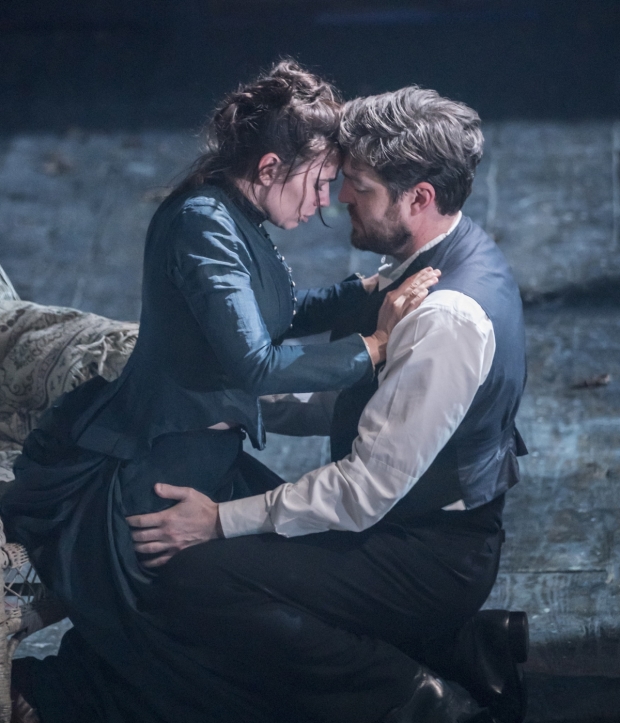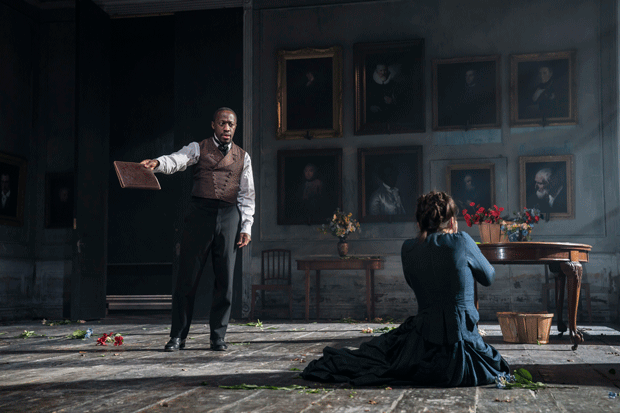Rosmersholm Casts Its Spectral Gloom Over Our Present-Day Woes

(© Johan Persson)
Watching the ominous first moments of Rosmersholm, now completing its run at the Duke of York's Theatre in London, you might expect to see Miss Havisham glide through the smoky air in her faded bridal gown and settle quietly into the sheet-covered furniture. Instead a young woman noisily rushes into the room, toppling chairs as she races to a window. Unexpected moments like this are elegantly woven into Duncan Macmillan's new adaptation of Rosmersholm, a lesser-known Ibsen work that every theater lover and Ibsen completist should rush to see while they can. With any luck the production will transfer to the States along with its first-rate cast, led by Hayley Atwell, Tom Burke, and Giles Terera.
Like Miss Havisham, the characters of this dark, subtly erotic play are haunted by the past. The estate of Rosmersholm, where a mysterious white horse is rumored to appear just before someone dies, is the residence of ex-pastor John Rosmer (Burke in a strong, conflicted performance), who has lost his faith and whose wife, Beth, drowned herself. Rebecca West (Atwell as a subtle agent provocateur) came to Rosmersholm years earlier to be Beth's companion, bringing with her some mysterious motives and a scandalous past. Things begin to fall apart when Rosmer, who now embraces progressive politics, voices his intent to back a new-government candidate. In retaliation, Rosmer's ruling-class brother-in-law, Kroll (Terera), publishes an article denouncing Rosmer and implying an illicit relationship between Rosmer and Rebecca. Acknowledging the truth of the accusation, the pair become racked with guilt, blaming themselves for Beth's suicide and forcing them to make a tragic decision.

(© Johan Persson)
Like Rosmer himself, Rosmersholm rarely cracks a smile. Yet audiences will find some occasions to chuckle at the political events described in the play, which resemble those happening around the world now as social movements rally for marginalized communities and try to overthrow patriarchal power structures. Rebecca and Rosmer want to be a part of the change that will give everyone a fair shake, yet they still want to enjoy the security and privilege of Rosmersholm's forefathers, whose grave-faced portraits hang on the walls of Rae Smith's remarkably detailed set. But these violent contraries cannot, so the play suggests, coexist in the same individual. The production's dramatic final moments, which differ from Ibsen's original ending, make that idea clear, turning the house of Rosmersholm into a waterlogged House of Usher.
The image of a crumbling house helps make sense of the final act, which seems almost too theatrical to bear. But this is Ibsen after all, who sometimes allows dramatic symbolism to take the wheel while realism lies passed out in the back seat. Such suspensions of disbelief are often necessary when watching Rosmersholm, which, along with the play's soul-crushing themes of guilt, suicide, and incest, may be one of the reasons that it is not staged as often as other Ibsen works.
Still, director Ian Rickson has created a provocative and gorgeous production. Neil Austin's lighting design alternates claustrophobic shadows with welcome orange sunlight, teasing us with the thought that there might actually be hope for these tragic people, while composer Stephen Warbeck's delicate interludes and Gregory Clarke's jarring sound effects create an atmosphere that foreshadows imminent doom. Among the exceptional performances (Lucy Briers, Jake Fairbrother, and Peter Wight complete the top-notch principal cast), Terera as Kroll deserves special mention for perfectly embodying the privilege and resistance to change that characterize conservative parties. As the world churns from social upheavals and attempts to battle unethical populist demagogues, Rosmersholm reminds us that at some point we have to take a side.
For tickets to Rosmersholm, click here.










